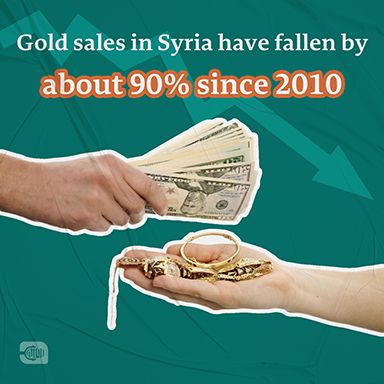Syrian gold fraud hits the inside and crosses the border
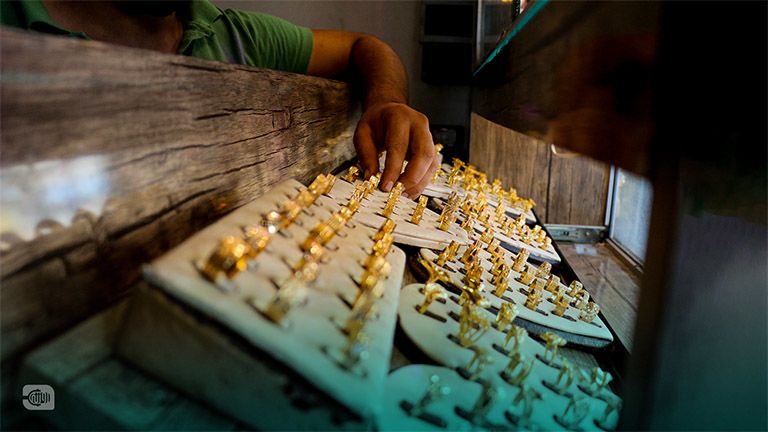
“I never knew that what I had in my hand was never gold; I desperately needed money, and I decided to sell my bracelet, which I had bought several years before I left Aleppo.”
With these words, Mrs. Afra-H described an attempt to sell her gold bracelet, to be surprised by the reaction of the jeweler, whose shop is located in the Karatash district of Entebbe, southern Turkey, when he told her that the bracelet was not made of gold. And as he saw her shockness to his words, he melted the bracelet in front of her with fire, telling her that it was just a piece of iron and nothing more.
Mrs. Afra's words led us in a "Rozana" in a prolonged search for some traders who "cheated gold" and tampered with its carats.
During our investigation, which was carried out by communicating with a number of Syrian goldsmiths in separate areas of Syria and Turkey, we have already ascertained that some traders cheated gold.
Gold workshops rely on different techniques in deceiving buyers. However, there are two main ways used wildly, as they either manipulate buyers selling them “18” carats as “21”, or by changing the base metal and replacing it with a mixture of metals that give a close look of original gold.
While some resort to forging the entire piece; and sell it as gold, as indicated by the owner of a gold store in the Kartaş, district of Gaziantep. He says, presenting one of the strangest stories of "gold fraud" that he encountered that "a woman asked me to weigh her gold necklace in order to sell it, as it weighed about 50 grams, and after I burned the piece, it turned out to be forged and completely made of copper."
The owner of one of the largest gold-selling companies in Aleppo, who preferred to remain anonymous, told Rozana that “the war had produced a number of new gold-manufacturing workshops owners, who can be considered “Outsiders”. They sometimes play with the Gold-Carat, and pump them into markets outside the regime’s control in order to sell that gold and take advantage of the price differences therein”.
The goldsmith pointed out that he revealed multiple cases of forgery of gold coins by some ordinary people who wanted to sell them to him. Nevertheless, he neither confirmed nor denied the existence of workshops and gangs that practiced forgery of the precious metal.
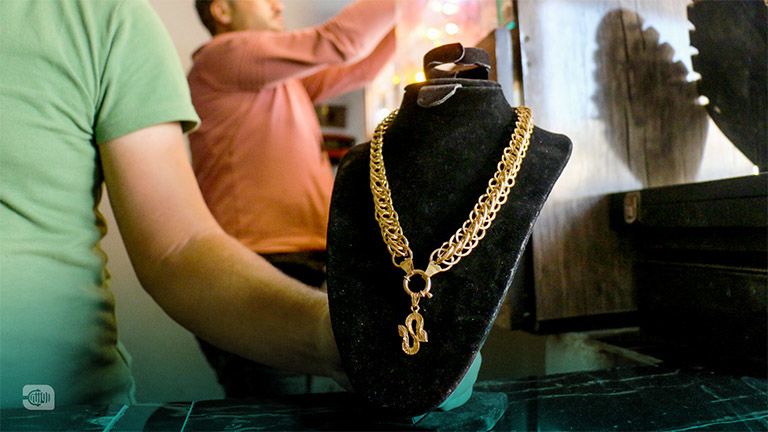
Gold Market- Idleb
Gold Market- Idleb
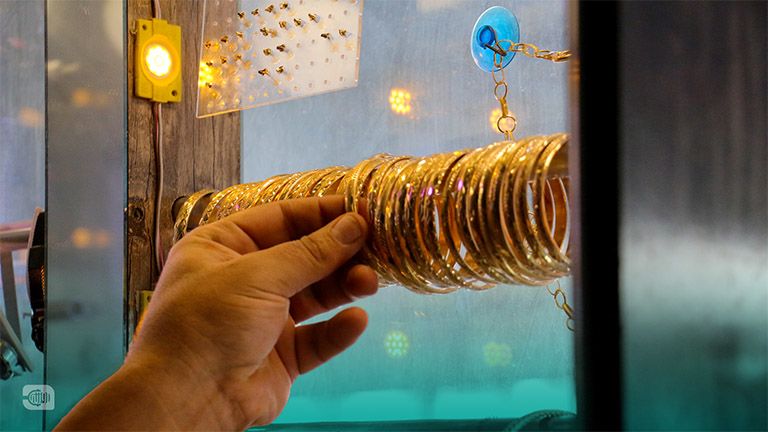
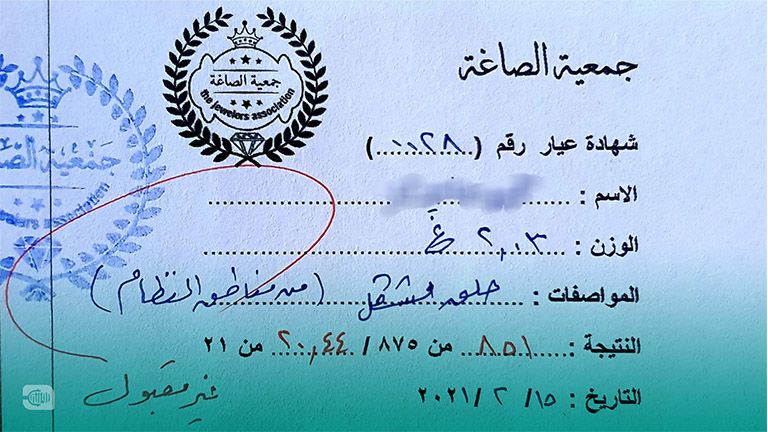
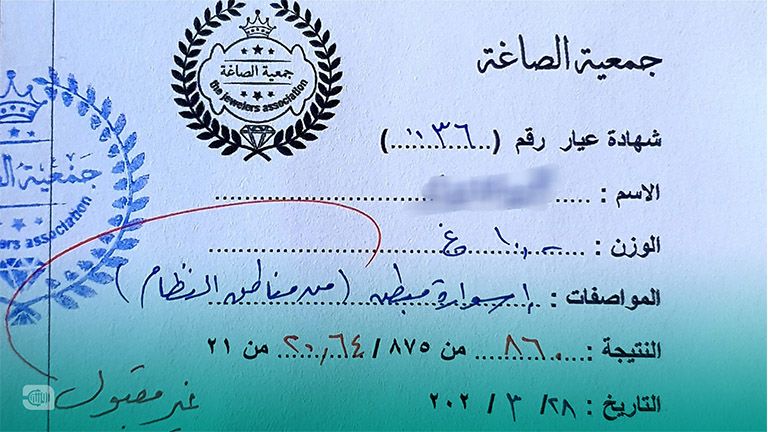
"War merchants" have parasitized the profession
The same source confirmed to "Rozana" that "the Goldsmiths Association in Aleppo is strict in dealing with cases of fraud that may affect the gold industry," and that "all shops selling gold are subject to strict standards, in order to obtain (the association's stamp)", but At the same time, he revealed that a number of cases of cheating in carats of the precious metal were recorded, without disclosing their numbers, saying only: "They are few, and do not exceed the fingers of one hand."
Mosab Al-Aswad, head of the Goldsmiths Association in northwestern Syria (which was recently established), accused some gold traders in the regime-controlled areas of “manipulating its caliber and exporting (false) quantities of it to the northern markets,” confirming the seizure of “dozens of low-caliber pieces.” (photos), and that they “confiscated it and prevented its sale.”
He pointed out that "cases of fraud by traders in the regime's areas prompted the region's traders to obtain gold from the Turkish markets, or by relying on private workshops in northern Syria."
Sales in Turkey
A number of merchants whom Rozana met estimated the amount of gold sold by Syrian goldsmiths in Turkey of about 100 kilograms per day, as Istanbul comes in the fore and controls 80% of the market, while the amount of gold sold among Syrian traders in its bazaars exceeds more than 2 tons per day
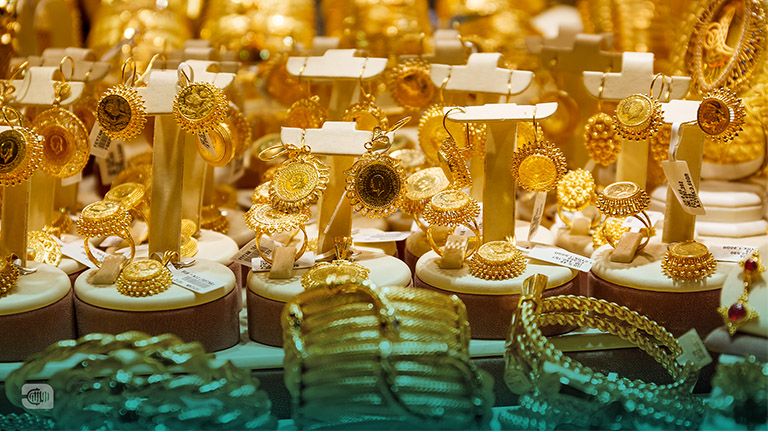
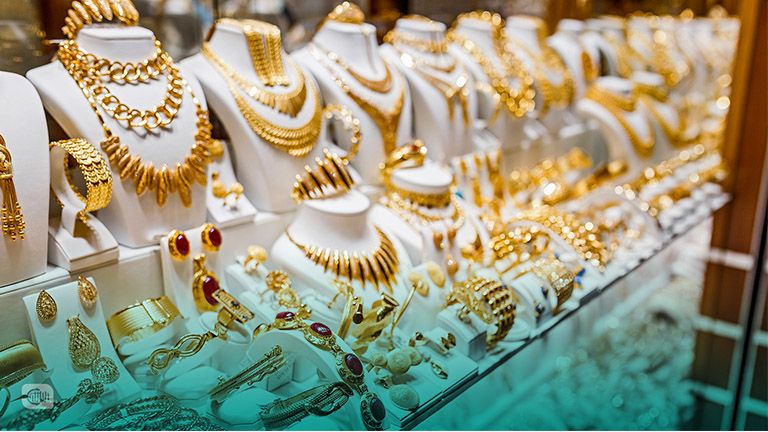
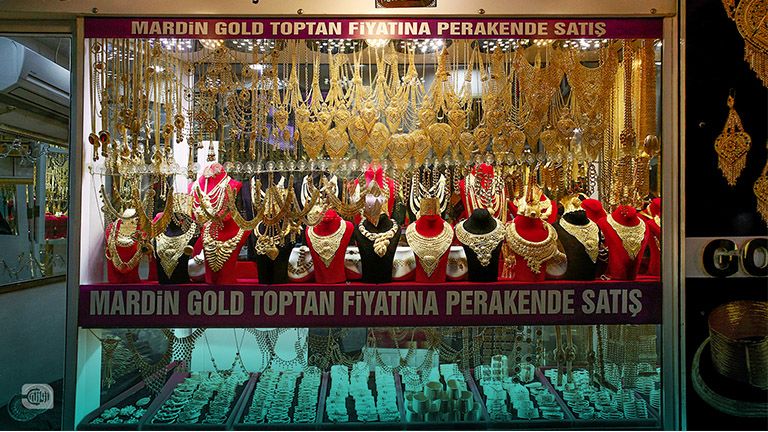

Gold Market - Istanbul
Gold Market - Istanbul

Gold Market - Istanbul
Gold Market - Istanbul

Gold Market - Istanbul
Gold Market - Istanbul
Market control methods
Ammar Selo, the owner of the (Tiba and Al-Amal) jewelry company, does not believe that relying on the Turkish markets is the solution to preventing manipulation of the gold caliber. As he told "Rozana" that "the possibility of gold fraud in Turkey is very huge, and pumping it into the Syrian markets represents a huge risk, as there is no association that is concerned with monitoring the markets and granting calibration.
In his entirety, he demanded the formation of an association in the north that would carry out "surprising rounds against gold shops in order to take samples of their goods for calibration", and "to hold (the cheaters) accountable by breaking and melting the fraudulent gold, and then closing the violating shops."
As for the absence of a craft association in Turkey, to evaluate gold and put its stamp on it, this does not make the market open to "cheaters". Selo indicates that there is great control over the goldsmiths' shops in the Turkish markets; by subjecting questionable goods; which are examined by experts in calibration accredited by the state, and therefore whoever is proven to be (cheating) will get his shop cloned and will be criminalized.”
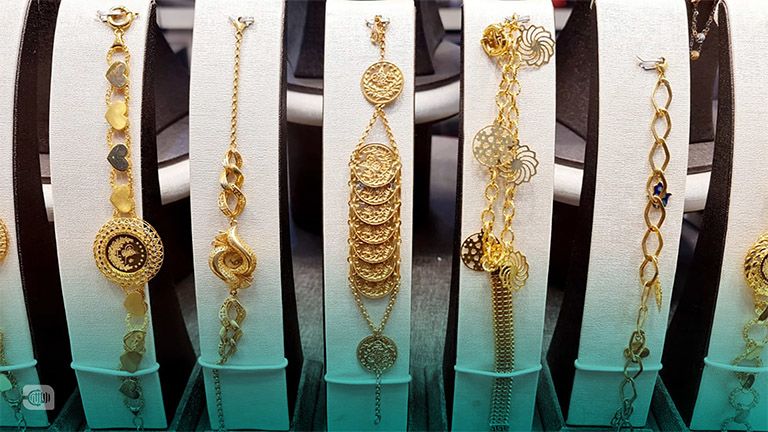
Gold Market - Istanbul
Gold Market - Istanbul
How Gold is Cheated?
Ammar Selo, the owner of the (Tiba and Al-Amal) jewelry company, does not believe that relying on the Turkish markets is the solution to preventing manipulation of the gold caliber. As he told "Rozana" that "the possibility of gold fraud in Turkey is very huge, and pumping it into the Syrian markets represents a huge risk, as there is no association that is concerned with monitoring the markets and granting calibration.
In his entirety, he demanded the formation of an association in the north that would carry out "surprising rounds against gold shops in order to take samples of their goods for calibration", and "to hold (the cheaters) accountable by breaking and melting the fraudulent gold, and then closing the violating shops."
As for the absence of a craft association in Turkey, to evaluate gold and put its stamp on it, this does not make the market open to "cheaters". Selo indicates that there is great control over the goldsmiths' shops in the Turkish markets; by subjecting questionable goods; which are examined by experts in calibration accredited by the state, and therefore whoever is proven to be (cheating) will get his shop cloned and will be criminalized.”
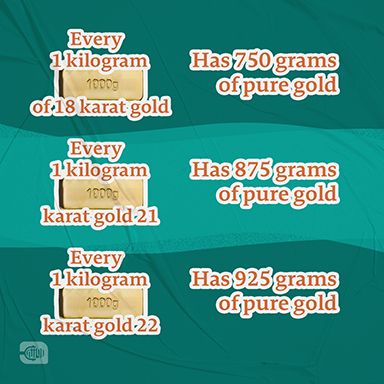
How Gold is Cheated?
Selo pointed out that "gold fraud operations mostly center around the reduction of caliber, explaining that "cheating operations - mostly - are revealed only by dissolving the gold," and that "fraud operations range from 10 grams per kilo to about 100 grams." Selo confirms that most of those who commit fraud are new intruders in the industry and spread in various Turkish cities, and in some Syrian markets.
Selo didn’t believe that “a caliber is more vulnerable to fraud than another,” stressing that “the Syrians’ demand of 21 caliber, made its formulation not confined to Syrian workshops, and encouraged a number of Turkish merchants to start manufacturing it,” stressing that “there is no comparison between the two Syrian 21 caliber or the 22 adopted in Turkey”, and that “the Syrians’ demand for the 21 carat comes from the motive of familiarity and not from price or value wise.”
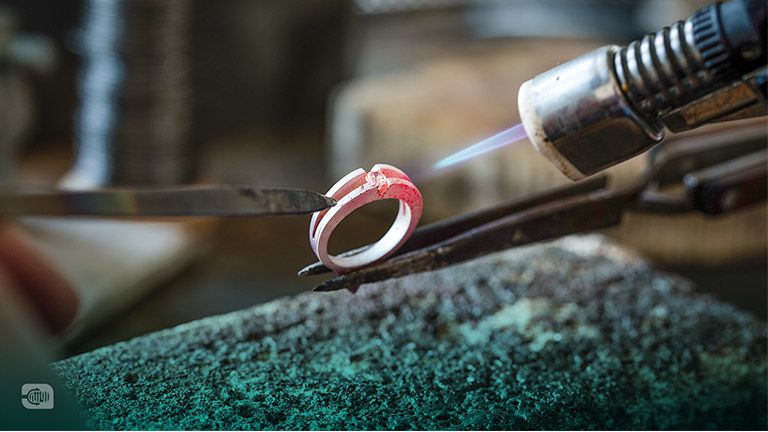
A photo of a gold processing workshop
A photo of a gold processing workshop
Adulterated gold is everywhere
The “gold fraud” was not confined to the opposition areas. Loyal media reports revealed the arrest of gangs involved in cheating the precious metal. The semi-official Al-Watan newspaper reported, in one of its issues, issued on August 13, 2014, that the Customs Directorate had seized varying quantities of fine and raw gold, in the goldsmiths' shops on Al-Abed Street in the capital, Damascus.
In the same year, pro-media media reported statements by Ghassan Jazmati, head of the Association of Goldsmiths and Jewelers in Damascus, in which he said that “the competent authorities have eliminated 50 people who cheated gold and sold it in the markets as original.” In his statements in mid-2018, he said that they “arrested the a gold counterfeiting workshop has been pumping fake gold into the market for seven years, "stressing that the counterfeiting operations are a systematic practice by gangs," while the news of the arrest of gold forgers in Damascus, Hama and Aleppo has not stopped yet.
Although no official statements have been issued regarding the background of the spread of “falsified gold” in the markets, the tensions between the craft associations of goldsmiths, and the Ministry of Finance in the regime’s government, over the consumer spending tax; may have allowed counterfeiters to pump quantities of counterfeit gold into the markets, taking advantage of the absence of a unified (imprint) for gold minted in the province.
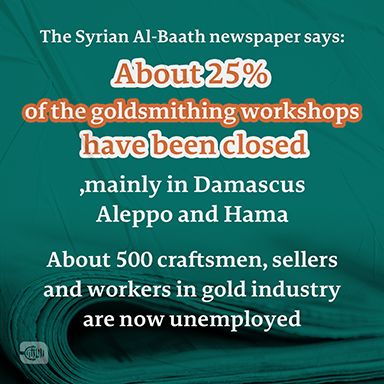
The emigration of hundreds of craftsmen out of the country, the destruction of their shops by the Syrian regime and the difficult economic conditions, as well as the decline in the purchasing power of citizens, may have contributed to the recovery and revival of counterfeiting of the precious metal.
"Abu Yahya", 70, worked in the profession for more than 50 years in the city of Aleppo, where he was one of the most prominent names when it came to calibrating gold. He was forced to flee to Turkey and then to France after his archaeological store was destroyed with explosive barrels, which the Syrian regime used; In addition to dozens of other shops in the market, he also lost his entire fortune in gold after thieves broke into his shop.
Abu Yahya refuses to talk about the profession in a negative way; as if it has become part of his soul and his memory. He does not like to appear in the media to talk about the ordeal that befell him after he was displaced from his place and lost his wealth. His only words were: "Gold... is gold...some thieves cannot become jewelers..they do not know the value of this metal, and they do not differentiate the good from the bad. My son spent about five years in another goldsmith’s shop until he mastered the profession (in order to earnestly learn it)..and I inherited it from my father, who inherited it from my grandfather..gold cannot be cheated.”
It does not seem that Abu Yahya is the only one who abandoned the profession and sought refuge outside the country due to war. "Jean Bablanian", the head of the Aleppo Goldsmiths Association, revealed in his statements that "the sheikhs of the profession left Aleppo during the years (the crisis); they spread to a number of countries in the world from Canada to Australia," and that "the number of workshops working in goldsmithing in Aleppo decreased From 1200 workshops before (the crisis) to about 40 workshops now, most of them are artisans who have recently entered the profession, and work inside their homes.
Talks of cheating on "gold" in areas outside the control of the regime have prompted a number of traders in the region to form an association to control its price and quality in the market. Al-Aswad said that "the main objective of our work is to establish a structure and an internal system that frames the work of gold dealers, stores and workshops in the region and documents its workers", while "preventing the practice of the profession by unlicensed people and enacting laws regulating their work".
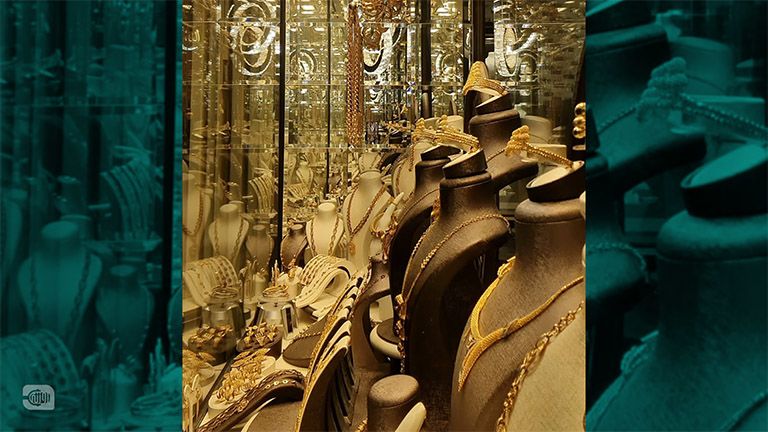
Gold Market - Istanbul
Gold Market - Istanbul
License Terms
Al-Aswad explained that the association will be concerned with "granting licenses to merchants wishing to practice the profession on conditions", including: "identification papers and logistical equipment (surveillance cameras, gold scales, bills, and others"). The association also stipulated: "The license applicant obtains a recommendation from licensed goldsmiths.
He added that "the number of practitioners in northern Syria has reached about 170 goldsmiths, scattered in the countryside of Aleppo and Idlib, who have obtained a license from the association. It takes samples from these stores and sends them for analysis, and accordingly gives permission to sell the product.
Al-Aswad indicated that the product quality testing method is carried out "through an advanced metal detector (X-ray), or by (chemical analysis), and that they "imposed owners to put up a trademark to distinguish gold and ease its monitoring."
In addition to the previous terms, the association has drawn up a list of penalties for violators, including: “Violation of pricing, the penalty for which is determined if it is committed for the second time, with a warning and a fine of two thousand dollars, and withdraw the authorization in the event of a repeat offence.
Sanctions
Persons in charge of the association assure that there is full cooperation with all local authorities in the region, to monitor the quality of the metal in the market and refer the violators to the judiciary, amid the interest of the rich people to buy the precious metal in light of the deterioration and prohibition of dealing with the Syrian currency, and the instability of the exchange rates of the Turkish lira, which is adopted in the markets of northern Syria.
According to the association’s bylaws, “Weight Cheating” is among the penalties, where, if committed for the second time, the violator is imposed a fine of ten thousand dollars and the closure of the shop for a month, while the license to practice the profession is withdrawn. If the violation persists, the violator is referred to the judiciary.”
Gold is considered a safe area for Syrians to save money, as its trading amount varies according to the regions in which they reside, despite the decline in the demand for its purchase; due to the weak purchasing power associated with the collapse of the value of the lira. Nevertheless, the profession is declining and almost receded in a number of regions because of the destruction of its main markets, as happened in the city of Aleppo; In addition to the emigration of thousands of its artisans outside the country.
